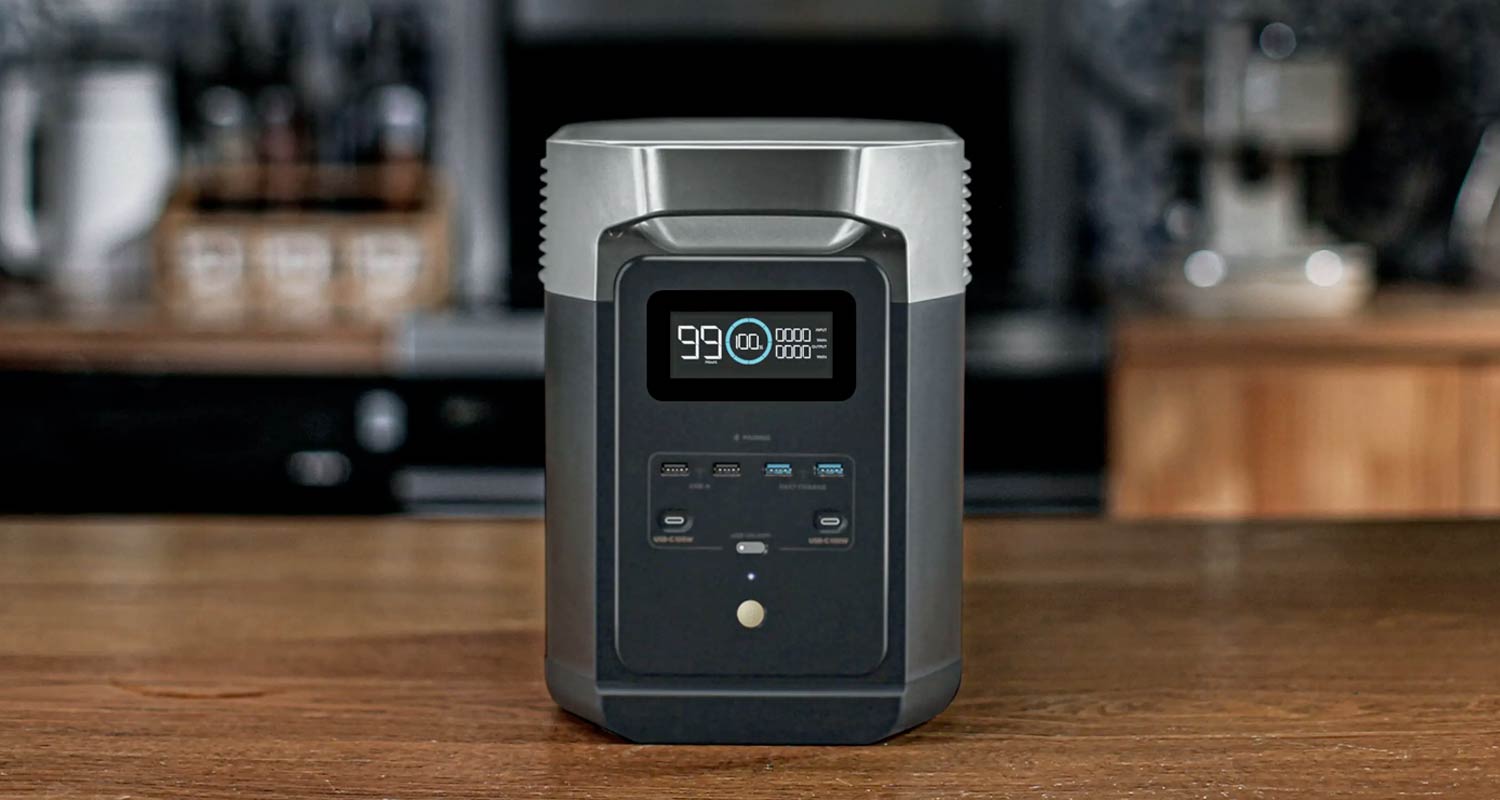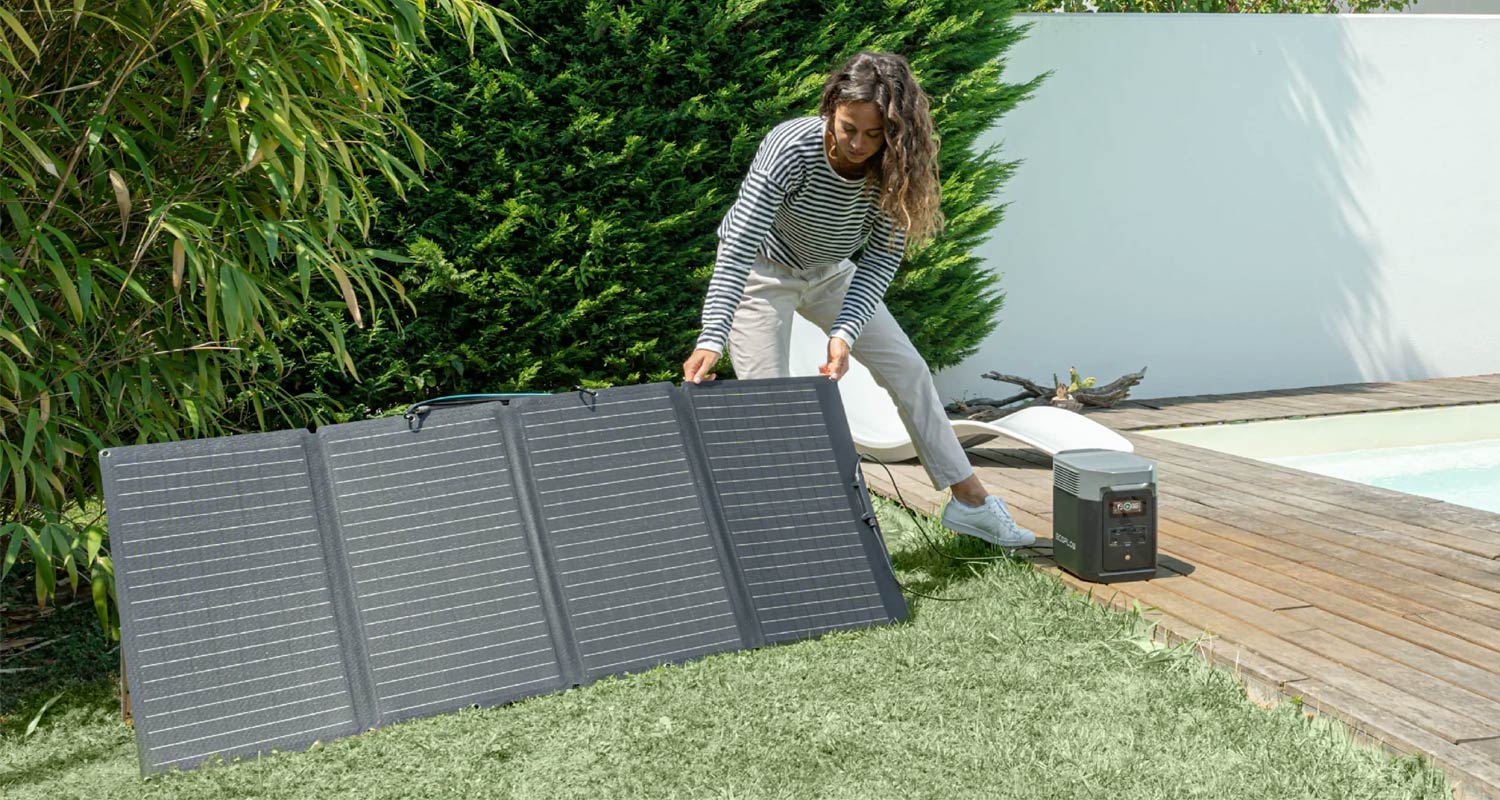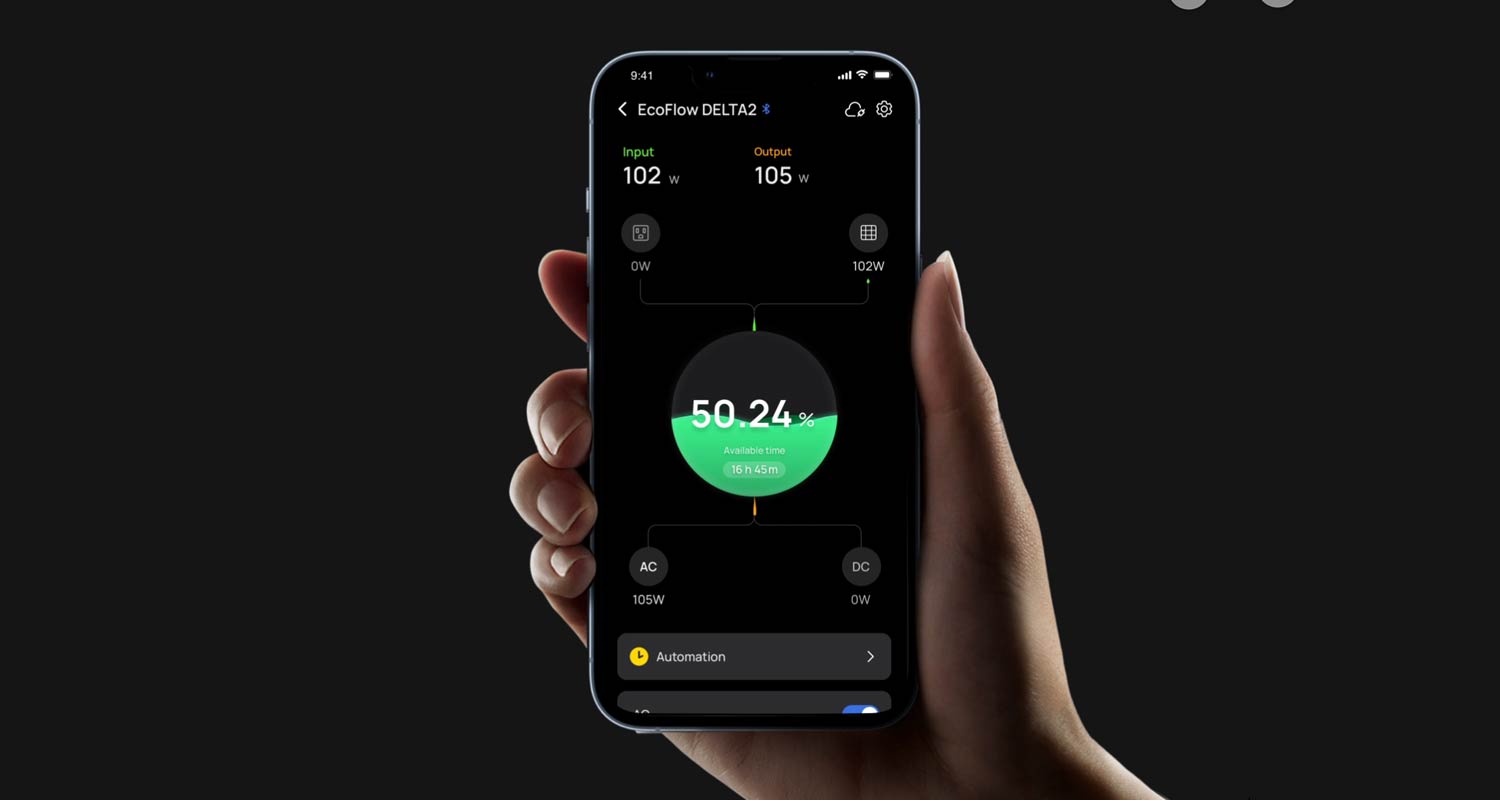
Many South Africans can’t afford to invest in expensive rooftop solar and fixed battery backup systems to insulate their homes (and small businesses) from Eskom’s load shedding.
For those people, there are two main options: buy a diesel or petrol generator, or invest in portable inverter/battery solutions.
The problem with generators is they’re noisy and smell bad, they have to be serviced regularly, and they cost an arm and a leg to run for extended periods.
Luckily, portable inverters and batteries have come a long way in recent years. Consumers have wised up to the fact that old-school trolley inverters with lead-acid-cell batteries (often car batteries) are not worth the hassle and cost of having to swap them out on a regular basis. They also weigh more than an adult elephant.
Enter a new generation of smarter – and much lighter – inverter/batteries powered by higher-density and longer-lasting lithium batteries. Here, consumers are spoilt for choice – brands like EcoFlow, Bluetti and Anker are all eager to get the attention of South Africans fed up with Eskom’s inability to provide electricity around the clock.
TechCentral has deployed several EcoFlow units – mainly EcoFlow’s 1kWh Delta 2 units – to power the publication’s hi-tech studio and editorial offices in Johannesburg. Having used the Delta 2 – and River 2 and River 2 Max – as daily drivers for some time, we have valuable insight to share into what makes these products good, and where they could be improved.
1kWh
The 12kg Delta 2 is a 1kWh battery inverter unit that provides sufficient power to run a desktop computer and large monitor through a five-hour power outage, provided the machine isn’t doing energy-intensive work such as rendering a video or playing a modern 3D videogame. It’ll power a laptop and an internet router, too, for an entire eight-hour workday, and keep basic studio lighting, a computer, monitor and multiple video cameras powered for several hours – enough to meet this publication’s studio requirements.
One of the biggest advantages of the Delta 2 – and other EcoFlow devices – is the ability to specify how fast they charge up when the power returns. At a maximum input of 1.2kW, it’s easy to recharge the Delta 2 completely between load shedding windows (it takes just 50 minutes to get to 80% capacity).
However, you’re going to want to reduce that to 500W (or less) to preserve the battery chemistry for as long as possible. (§ See note below article as EcoFlow has said charging speed does not reduce battery longevity.) At 500W, we found in our testing that the units could always recharge fully in time for the next outage, even at stage-6 load shedding. We also reduced the charging speed of our River 2 and River 2 Max units to 150W or less for the same reason, with no worries about not having maximum power stored for when the lights go again. The EcoFlows also run quietly – with little or no fan noise – when recharged slowly. Still, it’s nice to know they can be charged quickly in a pinch, if required (at stage-8 load shedding, perhaps?).

The EcoFlow devices, which are marketed in other countries as a convenient source of stored electricity when away from an electrical outlet – say, while on a camping trip in the bush – happen to work well in South African conditions. And EcoFlow, not surprisingly, actively markets its Chinese-made batteries as an ideal solution to load shedding.
The Delta 2 is easy to carry around – it has two solid plastic handles – and offers an excellent array of ports to keep your digital life powered up. On the front is a basic colour screen that displays the battery percentage remaining, input and output wattages, and expected time to drain based on current output. There are also four USB-A ports, two offering 12W charging and the other two 18W charging, and two 100W USB-C ports to rapidly charge up computers, smartphones, tablets and portable lights.
The rear of the Delta 2 has four South African three-pin sockets – two the large size and two the new, smaller size – as well as a 12V power outlet for use in a car. You can also hook up one of EcoFlow’s solar panels – sold separately – for charging at up to 500W from the sun. (We have not had a chance to try the panels.)
We tested the Delta 2 on a range of appliances and electronics – we started up a Defy freezer, for example, with no problem (it took less than an hour at a draw of just 100W to reach optimal cooling), and even operated a 1.8kW hair dryer at full power. Even a laser printer in our office, which draws an astonishing 2.3kW for a brief period before printing a page wasn’t enough to trip the Delta 2, which can output up to 2.4kW in “X-Boost” mode (which, given the noise the EcoFlow makes at peak power draw, perhaps should be called “aeroplane take-off mode”).
In normal operation, though, the Delta 2 is surprisingly quiet, especially if it’s only pulling a small amount of power – the fans only seem to kick in at about 150W power draw. When it’s not outputting any power, the unit is mostly quiet, though the fans kick in occasionally when it’s connected to the mains. Although still relatively quiet, we wouldn’t recommend keeping the Delta 2 in your bedroom as there is a chance it will disrupt your sleep.
Power app
One area where EcoFlow excels is in its mobile app. The company has clearly invested time and money on it. It is intuitive to use, and provides granular control over the company’s products. It’s handy to be able to see the current status of all the EcoFlow products you own on a single screen and to be able to power the devices on and off remotely, even from the other side of the world. The app is also useful for changing a wide variety of settings, including charging speeds. You’ll also want to use the app to update the firmware on the EcoFlows devices, as the company regularly adds features and other improvements.
There is, however, one downside, which consumers should be aware of when buying an EcoFlow battery, including the Delta 2: these are not meant to be used as UPSes, meaning they do not provide an uninterrupted supply of power when Eskom switches the lights off. That’s fine if you’re using your EcoFlow as an occasional source of power, but more problematic when you want to use one of them to power electronic devices that require constant power.
In our testing with the Delta 2, a Windows PC and an Apple Mac Mini both stayed on when the mains went off. However, television sets seemed to struggle more, switching themselves off before coming on again once the power flow resumed milliseconds later.
We asked EcoFlow for comment on this, and company spokesman Orange Lin said its products are equipped with an “EPS function”. This means a 30ms delay between the mains dropping and inverter switching over to battery power, while a UPS has a delay of less than 20ms (and often 0ms). “EPS can meet the needs of most home appliances within the output range of our power stations in the face of load shedding. However, it is not suitable for equipment that requires a 0ms UPS, such as data servers and workstations, and this may cause data loss,” Lin said.
 Of course, one option is to first connect a small UPS to the equipment that needs a constant supply of power, and to then feed the UPS with power from the Delta 2 or other EcoFlow battery. That’s not ideal, though, and involves an additional expense. We hope EcoFlow fixes this issue when it releases the next generation of its Delta and River devices.
Of course, one option is to first connect a small UPS to the equipment that needs a constant supply of power, and to then feed the UPS with power from the Delta 2 or other EcoFlow battery. That’s not ideal, though, and involves an additional expense. We hope EcoFlow fixes this issue when it releases the next generation of its Delta and River devices.
Another thing to bear in mind is that the Delta 2 – and other EcoFlows – offers 3 000 cycles, after which the battery is no longer guaranteed to retain more than 80% of its original capacity. This is normal, and 3 000 cycles is quite respectable in a consumer-grade product like this one (competing lithium products offer as few as 800 cycles). EcoFlow reckons you’ll get at least a decade of normal use out of the Delta 2, but that may depend on just how bad load shedding gets in the coming years.
“The Delta 2 and River 2 series offer 3 000 battery cycles before reaching 80% of capacity, as the minimum number. The battery can still be used after 3 000 cycles,” the EcoFlow spokesman said. A charge cycle is when a battery goes from fully charged to fully discharged.
Although the EcoFlow batteries should last consumers a long time, eventually they’ll need to be recycled or otherwise disposed of in a responsible way. We asked the company what people should do when these batteries reach end of life. Lin said the company has been planning a battery recycling programme for some time. It will soon begin working with a specialised battery recycling company. “Customers can return their expired products to our after-sales department,” he said.
Delta 2 specifications
- Capacity: 1kWh
- AC output: Four outlets, 1.8kW total (surge: 2.7kW)
- USB-A output: Two ports, 5V, 2.4A, 12W max
- USB-A fast charge: Two ports, 5V, 2.4A/9V, 2A/12V, 1.5A, 18W max
- USB-C output: Two ports, 5/9/12/15/20V, 5A, 100W max
- Car power output: One port, 12.6V, 10A, 126W max
- DC5521 output: Two ports, 12.6V, 3A, 38W max
- AC charging: 1.2kW
- Solar charging: 11-60V, 15A, 500W max
- Car charging: Support 12V/24V battery, 8A
- DC charging: 1.1kW
- Battery chemistry: LFP (LiFePO4 battery)
- Cycle life: 3 000 cycles to 80+% capacity
- Connectivity: Wi-Fi and Bluetooth
- Dimensions: 400x211x281 mm, 12kg
With lithium prices having slumped by nearly two-thirds in the past year, many portable battery manufacturers – EcoFlow included – have become more aggressive with their pricing, making now a good time to invest in the technology. The EcoFlow Delta 2 retails for a recommended R24 999 – but do shop around for deals, as there are plenty of them online from local retailers. Extra 1kWh batteries, which effectively double or triple the Delta 2’s capacity, are currently available online for R13 999 each. – © 2023 NewsCentral Media

